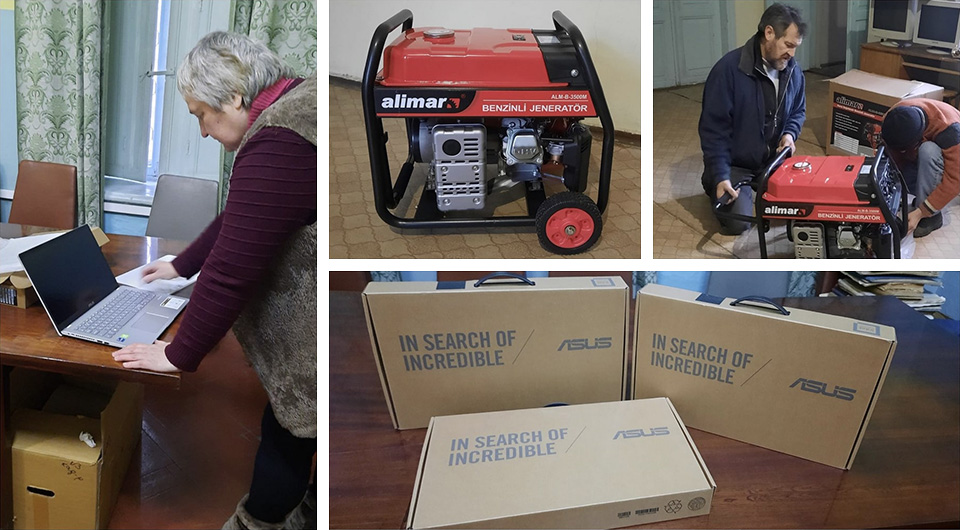Living in a war-torn country poses acute danger to civilians. In addition, an invasion places architectural sites, art objects, and archives under threat of being looted or destroyed. When Russia invaded Ukraine in February of 2022, SLIS alumna Anna Kijas immediately took action to protect Ukrainian cultural heritage.
Kijas, a music librarian at Tufts University, realized how vulnerable the collections in Ukraine had become. And as a Polish immigrant with many family members residing near the Ukrainian border, she was especially motivated to help Ukrainians preserve their history.
In March, Kijas hosted a virtual workshop with other librarians that focused on web archiving. This event quickly evolved into conversations about how to preserve Ukrainian artifacts.
"Within a few days, we had several conversations over Zoom," recalls Kijas. "My colleagues Quinn Dombrowski, Sebastian Majstorovic, and I co-founded Saving Ukrainian Cultural Heritage Online (SUCHO)." The specialists who lend their expertise to the initiative do so on a volunteer basis. "In the first week, we set up a Google form for volunteers, and we immediately got over 1,000 volunteers to sign up," says Kijas. In the beginning, SUCHO had between 300-400 people working on different tasks, as the war dragged on the number of people committed to working on this initiative decreased, so we now have around 50 or so core people, but every few days new volunteers emerge.

SUCHO is helping Ukraine preserve the digital presence of their architectural monuments, visual arts, archives, and libraries in several ways. For example, Kjias and her team are web archiving content from the websites of cultural heritage institutions. In December 2022, The Guardian reported on the real concern that Russia may try to expunge digital data, thus erasing the history and culture of Ukraine. Therefore, this kind of labor is crucial to the country.
"One of the things I have repeated in my presentations and discussed with journalists and students is that things that are digital are not permanent," stresses Kijas. "We tend to think that if it is in the cloud, then it is safe. But the cloud relies on servers, cables, etc., so there is a real vulnerability of the digital content disappearing if it is not backed up and web archived." To date, SUCHO has web archived over 5,000 cultural heritage websites.
SUCHO also assists Ukrainians in preserving materials that have not yet been digitized. As Kijas explains, "we have been building relationships with different institutions in Ukraine and have been asking them what they need for digitization. For instance, they may need us to send scanners or other specialized devices that can scan or photograph precious materials." Moreover, SUCHO provides training services and instructional videos on how to conduct emergency conservation.
SUCHO has also secured external sources of funding, including server space donated by Amazon Web Services. So far, the initiative has raised over 200,000 euros, and is actively working to raise more. Individuals can make donations (including anonymous donations) through their Open Collective international fundraising platform.
Kijas feels particularly gratified when helping smaller cultural heritage institutions, including regional libraries. "Some of these institutions don't have a big digital footprint, but they have wonderful objects. For example, I became aware of a local library that has drawings by Ukrainian children that were made to support the troops and express love for their family members and their country. I am especially touched by these kinds of collections," expresses Kijas.
This preservation work constitutes a high stakes project. In the context of invasion and war, librarians are up against the threat of a collective cleansing. According to Kijas, "in terms of identity and attack on cultural heritage, it is a literal attack on culture and identity of Ukrainians and their country. Reports from Ukraine's Ministry of Culture are assessing damage to cultural heritage sites. These attacks are trying to erase Ukraine's traditions and heritage. The Ministry of Culture inventory provides evidence of war crimes. Historically, we have seen this before: the removal of a culture through genocide and looting."
Memorials and monuments, such as Jewish cemeteries, Holocaust memorials, and places of worship, have suffered the worst damage. "Some sites have been bombed or destroyed, and we now have images of what they used to look like," remarks Kijas. "This is another way we can help the people of Ukraine."
Kijas credits her Simmons education for introducing her to a vast variety of knowledge and skills. "When I was a student at Simmons," Kijas reminisces, "I took classes with archives faculty and with metadata [descriptive data about a certain object within an archive or collection]. My curiosity was piqued when I was a Simmons student, and this is crucial to what I do at SUCHO."
For Kijas, co-founding SUCHO has enabled her to use her background as a librarian to help people in need. "I can't be there physically to preserve physical content, but I can at least help them preserve digital content," Kijas explains. "I am proud to help in this way."

